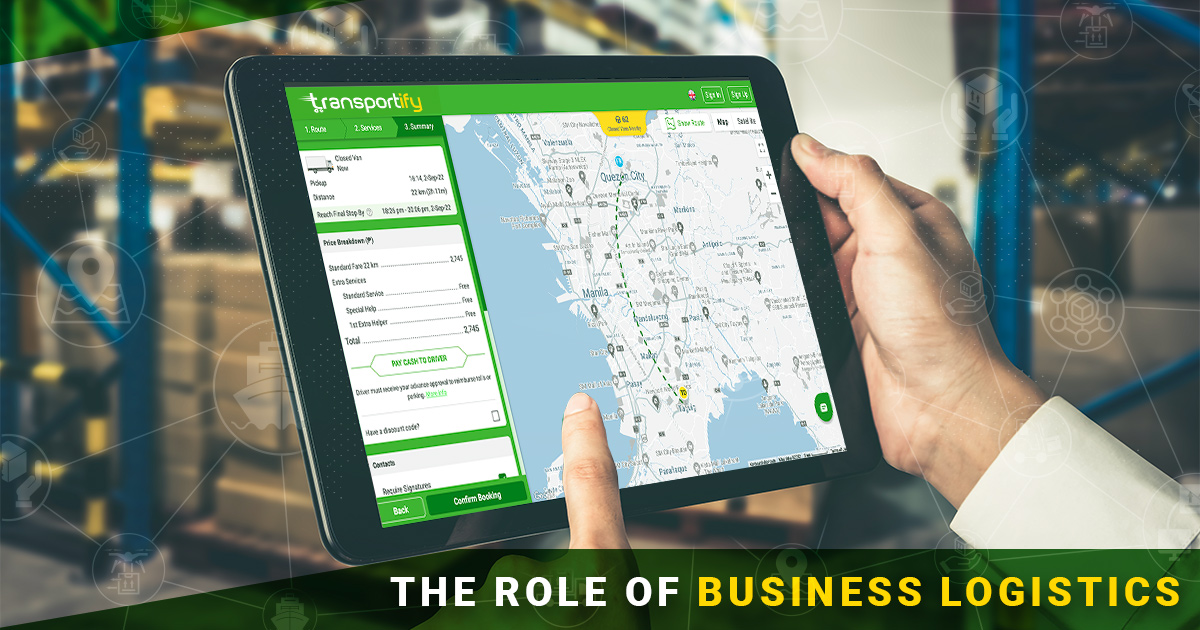
The role of logistics in business is critical for achieving long-term goals and providing exceptional customer service. Business logistics services go far beyond moving goods from point A to point B and can be a huge contributor to an organization’s success or failure and its bottom line.
There are many benefits to having a well-organized business. This includes everything from customer service to employee management. It also helps with inventory control, production scheduling, and even accounting.
What Is the Current State of Consumer Behavior?
E-commerce has been growing for several years, and we see a shift from brick-and-mortar stores to online shopping. The main advantage of e-commerce is that customers no longer need to visit physical shops. They can shop at any time they want and from anywhere. This makes e-commerce much easier for consumers.
However, it also means that retailers must be able to deliver goods quickly and efficiently. That’s where e-commerce logistics come into play. Transport Intelligence’s latest report shows that the global e-commerce logistics market grew by 19.9% from 2019 to 2021. Furthermore, the global electronic commerce logistics market is predicted to expand at an 11% CAGR during the forecast period (2020–2026).
If you want to make sure your business runs smoothly, read on to learn how logistics meaning and its services affect your business.
Definition of Terms
What is Business Logistics?
Business logistics is a set of business activities undertaken to manage all aspects of the supply chain process. This includes managing raw materials used to make products, providing efficient distribution centers, and ensuring that customers receive exactly what they want when they want it.
The role of logistics in business is that it can help organizations reduce costs, improve efficiency and increase profit margins. It can also help organizations improve employee productivity and performance. The role of logistics in business is to provide a smooth operation without interruption in production, delivery, or customer satisfaction.
What Is Logistics Management?
Logistics management refers to the processes involved in moving goods from point A to point B. On the other hand, procurement involves finding the items needed to complete a project. Transportation includes planning and scheduling shipments, and inventory control focuses on keeping track of what needs to be done next.
 |
Procurement is handled by purchasing managers who oversee contracts and agreements with suppliers. Logistics are managed by logistics managers who plan routes, coordinate shipments and manage drivers.
There are so many factors involved in shipping and logistics that success depends on attention to detail. Routing strategies depend on locations, traffic patterns, weather conditions, and regulations.
Logistics management software can assist in all these areas, making things more efficient and cost-effective. Shipping containers need to be selected properly and filled with the right amount of product. Costs must also be factored in, including insurance coverage, rates, and taxes.
Logistics Management Software Benefits
Logistics management software(LMS) helps companies manage their supply chains efficiently. It allows them to track shipments, plan routes, determine shipping costs, forecast demand, and optimize inventory levels.
If you want to read more about the logistics management process, you can check out our article for a comprehensive overview.
Role of Logistics in Business Management
The role of logistics in business is managing all aspects of a company’s operations, from sales through production and distribution. The goal is to maximize profits while minimizing costs. A logistics manager must be able to forecast demand, develop strategies for efficient delivery, and ensure quality control. They must coordinate with other departments, such as human resources, finance, information technology, and legal affairs.
Logistics is the main component of any successful business. Logistics is all about moving things around. As such, it greatly impacts a company’s bottom line. Successful logistics make businesses more efficient, reduce costs and improve customer satisfaction.
These factors can improve a company’s performance. However, they don’t end there. Logistics also affects return management, which includes extracting maximum revenue for each product returned.
How Does Business Logistics Work?
Businesses are about exchanging goods or services for money and trade. Logistics is how these exchanges happen. Sometimes goods move in bulk, such as large amounts of raw materials being shipped to a factory. Other times goods come out individually, each customer getting what they paid for.
While it sounds pretty straightforward, there’s much more to it than meets the eye. Here’s a breakdown of logistics and how it affects businesses today.
The Backbone of Logistics
Materials:
Strategic sourcing is important in logistics since it ensures that your company gets the best possible prices for its inputs. This means having access to suppliers who can provide high-quality raw materials at competitive prices.
Movement of inventory:
To complete an order, products must be selected from warehouses based on customer orders, packed appropriately, labeled, and sent out to customers. These steps compose order fulfillment. Together they make up the logistics chain, the backbone of fulfilling orders.
Warehouse control:
Warehouses can provide both short-and long-term storage services. Short-term warehousing refers to storing goods temporarily until they can be delivered to customers. Long-term warehousing is used when goods are stored for an extended period.
Warehouse management systems (WMS) help logistics managers plan and manage warehouse operations. WMSs can automate many processes, including stock taking, order processing, and invoicing.
Inventory demand:
Logistics depend upon inventory demand forecasting to ensure that a company never runs out of key or high-demand items. Using a combination of manual and automated methods, you can avoid overstocking and identify patterns in sales. By planning, you’ll also reduce the risk of losing stock due to slow-selling items.
Retail sales often vary by store location, region, and country. To ensure efficient inventory controls, retailers may move poor-performing items out of one store or region to sell elsewhere. Logistical analysis can help ship products to their destination at the lowest cost. Companies can use this information to plan for increased demand for seasonal or trending products.
Supply chain management:
Logistics is an essential part of any supply chain. Without proper logistics, the flow of products would be disrupted. Logistics can be defined as “the art of moving things.” In the case of food, this means getting raw materials from farms to stores and delivering finished products to customers.
Curious about finding out more?
You can learn about these advanced terms in logistics by consulting this link.
SEE ALSO:
- What Is Shipping Management and What Does It Include?
- What Is Transport Management System? (2023)
- 5 Reasons Businesses Should Have Transport Management System
What Are the Challenges of Business Logistics?
There are many challenges that businesses face when it comes to logistics. Some of the most common challenges include:
Cost
Managing logistics can be expensive, particularly for companies that operate globally. The Council of Supply Chain Management Professionals’ research shows that logistics costs for US businesses average 10.7% of revenue. This expense can be even more significant for companies that operate in multiple countries.
Complexity
Creating and executing a logistics strategy is a challenging endeavor that demands meticulous attention to several factors. One of the most critical factors is the type of goods being transported, as perishable items need different handling and transportation than non-perishable ones. Additionally, the distance of transportation is a significant factor, as goods traveling over long distances may require distinct modes of transportation than those being shipped over shorter distances. The regulatory environment is also crucial in logistics strategy, particularly for businesses transporting goods internationally, as they must comply with various regulations.
Efficiency
In order to reduce costs and meet customer expectations, businesses must operate efficiently, especially when dealing with large volumes of goods. To achieve this, there are several strategies that businesses can implement to improve logistics efficiency.
- Consolidating shipments: Consolidating shipments can help businesses to save money on transportation costs.
- Using technology: Technology can help businesses to improve their logistics efficiency in a number of ways, such as tracking shipments, managing inventory, and optimizing routes.
- Outsourcing logistics: Outsourcing logistics to a third-party logistics provider can help businesses to improve their efficiency by freeing up internal resources to focus on other areas of the business.
Security
To ensure the security of their goods in the supply chain, businesses must protect them from theft, damage, and pilferage. This can be achieved by implementing security measures like cameras, fences, and guards, working with partners such as suppliers and shippers, and enforcing security policies to ensure all employees are aware of and following proper procedures.
What Is the Difference Between Logistics and Supply Chain Management
Logistics is moving goods from one place to another using different modes of transportation such as trucks, trains, planes, and ships. Supply Chain Management (SCM) is the process of planning, coordinating, controlling, and optimizing all activities related to the flow of materials. SCM includes procurement, manufacturing, distribution, sales, and customer service.
Logistics companies include shippers, carriers, freight forwarders, warehouse operators, and truck drivers. In addition to the aforementioned factors, there are also such things as labeling, packing, inventory management, forecasting supply, transport, raw materials, the flow of goods, and their transport.
Where to Use Business Logistics Services
You would know by now that logistics involve transportation, warehousing, inventory control, and customer service. For example, a food processing plant would have different logistical needs than a medical device manufacturer. Depending on the type of industry, different factors should be taken into consideration when determining how the logistics process should work.
In a direct-to-consumer scenario, the supply chain coordinates the movement of goods from manufacturer to retailer and finally to the customer. This ensures that the customer receives their order promptly and that the retailer can keep up with demand for their products. The process includes arranging transportation, handling customs clearance, and tracking the shipment.
Another case is where business logistics services can be involved in order fulfillment. This is the coordination between suppliers and retailers to ensure the timely delivery of products. It usually happens after the order has been placed but before the order has shipped.
By 2021, the global e-fulfillments market had already reached about $53.2 billion. E-commerce has become one of the most popular ways for companies to ship their products. More companies have expanded their services to include more e-commerce integration.
When you go to Amazon.com, you will see a list of items that are available for purchase. You can click on one of these items to view more information and add it to your shopping cart. At this point, Amazon will take care of your shipping and handling.
Benefits of Logistics Management
Companies that manage their logistics more effectively tend to have lower costs and greater profits. Logistics management affects how quickly companies can move their products around the world. There is a direct correlation between effective logistics management and positive financial performance. Businesses that fail to do this risk losing money and missing out on opportunities.
Here are some of its four major benefits:
- Logistics management reduces errors when managing inventory, shipping, receiving, storing, and distributing materials. These processes must be automated to ensure that they run smoothly and efficiently.
- It cuts overhead costs by reducing supply chain complexity and improving inventory visibility. The goal is to reduce the time needed for receiving orders, processing them, and shipping them out again. This helps avoid costly excess capacity and reduces the need to store large amounts of inventory.
- The management improves customer experience by effectively delivering goods and services. A company’s ability to deliver products and services to customers at the right time, place, quantity, quality, and price creates a positive perception of the company among consumers.
- Logistics Management tracks the movement of stock using barcodes and radio frequency identification technology (RFID). This system allows for real-time inventory tracking during the supply chain process. The software also helps managers identify where to focus efforts to reduce costs.
7 R’s of Logistics
The chartered institute of logistics and transport defines the seven Rs of logistics:
- Right product
- Right quantity
- Right condition
- Right place
- Right time
- Right customer
- Right price.
If you want to learn more about the seven R’s and why they’re so important in business logistics, check out our article here.
 | or |
Frequently Asked Questions:
What is the role of logistics in business?
🚚 An efficient and effective logistics system is essential for businesses to compete in today’s marketplace. Logistics management in business is responsible for planning, coordinating, and executing all activities involved in the movement of goods. It can help businesses save money by reducing transportation and storage costs and improving efficiency.
What is the most common business logistics challenge?
🚚 The most common business logistics challenge is coordinating the transportation of goods to meet customer demand. This can be complex and require managing inventory levels, predicting customer demand, and planning production schedules. Many software programs and tools are available to help with this coordination, but it can still be difficult and time-consuming.




 INSTANT QUOTE
INSTANT QUOTE

 Chat
Chat